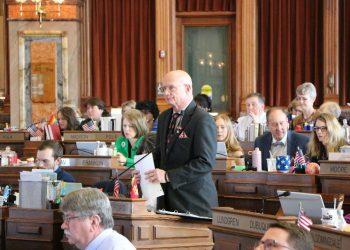DES MOINES, Iowa – An Iowa House subcommittee advanced a bill, HF 222, that would penalize public schools, community colleges, and Regents universities that use a curriculum based on The New York Times Magazine’s 1619 Project.
State Reps. Skyler Wheeler, R-Orange City, and Henry Stone, R-Forest City, supported the bill. State Rep. RasTafari Smith, D-Waterloo, opposed the bill.
The 1619 Project has drawn controversy. Some have praised the series of essays, one of which received a Pulitzer Prize. Still, it has also been criticized by historians for what they say are significant inaccuracies.
The New York Times Magazine describes the project this way, “The 1619 Project is an ongoing initiative from The New York Times Magazine that began in August 2019, the 400th anniversary of the beginning of American slavery. It aims to reframe the country’s history by placing the consequences of slavery and the contributions of black Americans at the very center of our national narrative.”
Under the bill, if a school uses any curriculum derived from The 1619 Project, it will be subject to a reduction in that school’s appropriation based on the number of days the curriculum is used.
Several school groups opposed to the bill spoke during the subcommittee hearing. Mary Brown representing the Iowa Board of Regents said they were registered against the bill. “The board feels legislating academic course content is not appropriate,” she said.
The Iowa Association of Community College Trustees representative said he opposed the bill because it took away local control since a locally-elected board of trustees governs community colleges.
Emily Piper with the Iowa Association of School Boards said her organization is registered against the bill, but not because they endorse The 1619 Project. “We don’t believe we should go down the path of having state legislature set laws as to what we can and cannot teach, and what curriculum we can and cannot use. We think that’s a very dangerous precedent,” she said.
Piper added that elected school board members could make these decisions.
Pete Hird representing the Iowa Federation of Labor, AFL-CIO, called the bill censorship and registered his opposition.
Laura Hessberg with Iowa Coalition Against Domestic Violence also opposed the bill.
“We can all have different views of history. I was a history major. And there was healthy debate in those classrooms, as it should be in every classroom in high schools all across America. I don’t mean to dishonor anyone’s views here. But what we can’t be afraid of opposing views,” she said.
The Iowa Department of Education’s representative said they are undecided on the legislation. The department’s attorney encouraged lawmakers to clarify how much of the curriculum would have to be used or how much of The 1619 Project would have to be referenced before the “tripwire is tripped.” He also inquired how much an independent curriculum a school uses would have to use similar themes before losing money.
Several private citizens came to support the bill.
Gary Moser, a retired teacher, said he supports the bill because he opposed The 1619 Project.
Sam Jones, the pastor of Grace Baptist Church in Hudson, Iowa, spoke in support of the bill.
“The 1619 Project paints a fallacious picture of the United States by using standpoint epistemology and critical race theory to reinterpret the founding of our nation and key principles that were once woven into the fabric of our society. Specifically, the 1619 project seeks to reinterpret history to tell children that America was founded on racism and founded to continue racism and that there remains a system of racism and oppression,” he said.
“The 1619 Project teaches that America was founded as a slave autocracy. The motivation of the founding fathers in 1776 was to continue slavery. The enumerated ideals in the Declaration of Independence, specifically, that all men are created equal, were false when they were written, and capitalism is a form of slavery,” Jones added.
Nicole Hasso, a mom from Johnston, said she supported the bill.
“If you try to change my history, you change who I am as a person,” she said. “I have two kids who are eight years apart. My daughter learned a history for her country that was less than par. And now my son just went through U.S. history, which was horrible, and he didn’t learn anything. question everything that his teacher told him.”
“if we’re going to do this, let’s do it right. I am a proud American citizen. I appreciate my freedom. I appreciate everything that this country stands for. I appreciate the history of this country. It took all the colors, men and women, if we’re going to discuss history, if we want to teach the true history of this country, let’s talk about that,” Hasso said, later giving some examples of history typically not taught in public school classrooms.
“So how dare someone wants to change the history. You cannot erase history. History is part of who we are. It’s part of the country. My history makes me who I am today,” she added.
Rita Davenport of Boone, a retiree who worked in higher education for 30 years, supported the bill. She also was appointed to the Commission on the Status of African Americans that is part of the Iowa Department of Civil Rights and served four years as a Commissioner.
“Throughout my life. I’ve been very aware that many of the differences among us have to do with economic class rather than race,” she said. “I do not discount the class disparities that exist to this day began with systemic racism such as redlining. I’m not of the opinion that the systemic inequities that happen in our collective American history are reason to declare that everything in our nation’s history is evil and racist.”
“The curriculum of the 1619 Project inaccurately teaches our children to believe that the very birth of our nation’s due to desire to preserve slavery. That is just one of its many inaccuracies,” Davenport said.
Edward Hayes, a retired Rockwell Collins engineer from Cedar Rapids, also supported the bill.
“With the 1619 Project, we’re presenting a view of history through one lens. And frankly, we need all the lenses,” he said. Truth is not the domain of white people. Truth is not the domain of black people. Truth doesn’t care. Okay, truth is truth. And I don’t care where it comes from, we need to assess it and look at it and take it all in the good, the bad, and the ugly, all of it,” he said.
Hayes listed different Black historical figures not mentioned by The 1619 Project who fought for American independence in the Revolutionary War and Black heroes who fought in the War of 1812, World War I, and World War II.
“We need to look at it all; we need to have that whole history presented,” he added.
Tamara Scott, a lobbyist for the Concerned Women for America of Iowa and Iowa Faith and Freedom Coalition, read a statement from Whitney Smith McIntosh. The letter took a partisan tone.
“The Democratic Party or the new slave masters and the 1619 curriculum project is their way to grow up the next generation,” she said. “Back when my great grandmother, four times great grandmother, Nancy Fairfax, who was a slave in Virginia, would say the slave master gave housing to the slaves. The slave master gave health care to the slaves. The slave master determined that the slaves were going to have children and how many, and the slave master fed the slaves. The slave masters saw the slaves as animals to be bread sold and traded.
“Today, the Democratic Party is trying to bring about socialism, also known as Communism, via the black, brown, and poor. They are targeting the black man and poor man by making them complacent and miseducated. This is done via section eight housing, EBT, minimum wage increases, no-cost health care for all, Planned Parenthood, and telling them how and when they have babies to be awarded with birth control. These programs and behaviors that the Democrat Party (are) engaging in are racist,” she added.
McIntosh recommended Iowa schools use Outside In: African-American History in Iowa 1838-2000 to teach Black history.
State Rep. Stone said he supported the bill. “The 1619 Project curriculum is inundated with errors of fact, and its interpretation that our nation is defined by racism, and was conceived in oppression is complete conjecture,” he said.
“As our nation tries to begin a healing process, and come together, I feel that this curriculum seeks to further divide our nation instead of bringing us together,” Stone added.
State Rep. Smith opposed the bill. He also took offense to McIntosh’s statement that the Democratic Party is the “new slavemasters.”
“To me, that’s an offensive statement as a proud Democrat. As a black man in America, it’s hard to entertain,” he said.
Smith pointed out that America’s history is complex and that schools can’t just teach some facts but not others. He also noted that Iowa schools are not mandated to teach The 1619 Project.
“Our founding fathers set forth an ideal of America, one that was complex. Just the statement that the founding principles of this country are freedom and equality, how can this be so true? Right? The ideal can be true. But the principle in itself is like theory and practice. In theory, it sounds great. In practice, though, my ancestors were not free or equal. Equality to this day is something that we’re striving for,” he said.
“Allowing educators the ability to challenge students with critical thinking skills, texts, essays, like The 1619 Project, which is a combination of essays, to be able to take from it what they will, to explore it from what they will, and create their own ideal about what that means for this country, is how we get past this divisive nature. But to not know our history is to repeat it,” Smith added.
“America allows the opportunity to have a diverse, rigorous debate about what it means to be in American, what America represents. You know, banning literature throughout history has been a process which is the beginning of certain things, right. You see, in Nazi Germany, they burned books that were unGerman, right? They reviewed history as a tool to bring people up in arms, or the lack of educating folks about history, to make individuals up in arms to do some of the most horrific things that we’ve seen in humanity’s history,” he argued.
Smith said we need different lenses and different perspectives, and passing the bill would be shortsighted.
State Rep. Wheeler, the author of the bill, said lawmakers are responsible for spending taxpayer money wisely. He then addressed Smith’s comparison of the bill to Nazi Germany.
“You compare this bill with Nazi Germany. There is nothing in this bill that seeks to distort or seeks to remove the teaching of slavery or Jim Crow. Things that I said that we need to learn about because history is about learning from your history, so you don’t repeat those things in the future. To compare this to Nazi Germany to me is extremely offensive,” he said.
Wheeler addressed why he introduced the bill.
“The 1619 Project seeks to tear down America, not lift her up. It seeks to divide, not unify. It aims to distort facts, not merely teach them, and it does so as leftist political propaganda masquerading as history,” he argued. “The 1619 Project has been shredded by historians and scholars all over the country, from different races, political ideologies, backgrounds, religions, and creeds. It is riddled with factual and historical errors. It has refused to accept to correct the historical inaccuracies that they’ve laid out. Why is that? Because as a founder of it said, this wasn’t really a historical project. This was a narrative project, or as I call it, leftist political propaganda masquerading as history.”
“There is no curriculum established in this bill. There’s nothing in this bill that bans the teaching of slavery, Jim Crow, as I said, both should be taught. There’s nothing in this bill that changes a single social studies standard, unlike a different bill, that some people in here who are registered against (this bill) have not registered against themselves. Historically, The 1619 Project fails from the very beginning,” Wheeler added.
He then provided examples of historical inaccuracies within The 1619 Project and its curriculum and examples of how it targets conservatives and Republicans while giving racist Democrats a pass.
The bill can now be considered by the Iowa House Education Committee.














